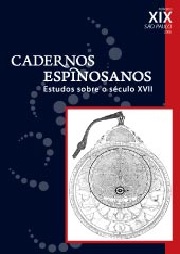The conatus in Spinoza: self-preservation or liberty?
DOI:
https://doi.org/10.11606/issn.2447-9012.espinosa.2008.89343Keywords:
Spinoza, Ethics, Conatus, Self-preservation, LibertyAbstract
The aim of this paper is to discuss an ambiguity of Spinoza’s conatus, that seems to sustain, at the same time, a “self-preservation” and a “liberty” ethics. We start by showing why the attempts of several authors to conciliate these two aspects fail, and then we argue that the only way to solve this problem is to consider that what must “stay in existence” isn’t the empirical individual of the common sense, but his “individuality”, related to a specific proportion of motion and rest that corresponds to his essence. To sustain this thesis, we’ll analyse Spinoza’s conatus, showing that it can’t consist only of physical elements, but it’s also a metaphysical principle, relating finite beings to the power of God. Only from this formal concept it would be possible to understand why the primordial striving for “self-preservation” leads to an ethics of liberty.Downloads
Download data is not yet available.
Downloads
Published
2008-12-15
Issue
Section
Artigos
License
Autores que publicam nesta revista concordam com os seguintes termos:
- Autores mantém os direitos autorais e concedem à revista o direito de primeira publicação, com o trabalho simultaneamente licenciado sob a Licença Creative Commons Attribution que permite o compartilhamento do trabalho com reconhecimento da autoria e publicação inicial nesta revista.
- Autores têm autorização para assumir contratos adicionais separadamente, para distribuição não-exclusiva da versão do trabalho publicada nesta revista (ex.: publicar em repositório institucional ou como capítulo de livro), com reconhecimento de autoria e publicação inicial nesta revista.
Authors who publish in this journal agree to the following terms:
a. Authors retain copyright and grant the journal the right of first publication with the work simultaneously licensed under the Creative Commons Attribution License that allows to share the work with an acknowledgment of its authorship and initial publication in this journal.
b. Authors are authorized to take on additional contracts separately, to non-exclusive distribution of the article published in this journal (ex.: to publish in institutional repository or as part of a book), with an acknowledgment of its initial publication in this journal.
How to Cite
Pereira, R. R. (2008). The conatus in Spinoza: self-preservation or liberty?. Cadernos Espinosanos, 19, 73-90. https://doi.org/10.11606/issn.2447-9012.espinosa.2008.89343


